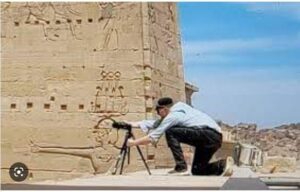 Working with the University of Ottawa, the researchers published their early findings in Egyptian Archaeology and have returned to Philae to advance the project.
Working with the University of Ottawa, the researchers published their early findings in Egyptian Archaeology and have returned to Philae to advance the project.
“It’s fascinating because there are similarities with today’s graffiti,” says SFU geography professor Nick Hedley, co-investigator of the Social Sciences and Humanities Research Council (SSHRC)-funded project. “The iconic architecture of ancient Egypt was built by those in positions of power and wealth, but the graffiti records the voices and activities of everybody else. The building acts like a giant sponge or notepad for generations of people from different cultures for over 2,000 years.”
As an expert in spatial reality capture, Hedley leads the team’s innovative visualization efforts, documenting the graffiti, their architectural context, and the spaces they are found in using advanced methods like photogrammetry, raking light, and laser scanning. “I’m recording reality in three-dimensions — the dimensionality in which it exists,” he explains.
With hundreds if not thousands of graffiti, some carved less than a millimeter deep on the temple’s columns, walls, and roof, precision is essential.
Typically, the graffiti would be recorded through a series of photographs — a step above hand-drawn documents — allowing researchers to take pieces of the site away and continue working.
Sabrina Higgins, an SFU archaeologist and project co-investigator, says photographs and two-dimensional plans do not allow the field site to be viewed as a dynamic, multi-layered, and evolving space. “The techniques we are applying to the project will completely change how the graffiti, and the temple, can be studied,” she says.
Hedley is moving beyond basic two-dimensional imaging to create a cutting-edge three-dimensional recording of the temple’s entire surface. This will allow the interior and exterior of the temple, and the graffiti, to be viewed and studied at otherwise impossible viewpoints, from virtually anywhere — without compromising detail.
This three-dimensional visualization will also enable researchers to study the relationship between a figural graffito, any graffiti that surrounds it, and its location in relation to the structure of temple architecture.
While this is transformative for viewing and studying the temple and its inscriptions, Hedley points to the big-picture potential of applying spatial reality capture technology to the field of archaeology, and beyond.
“Though my primary role in this project is to help build the definitive set of digital wall plans for the Mammisi at Philae, I’m also demonstrating how emerging spatial reality capture methods can fundamentally change how we gather and produce data and transform our ability to interpret and analyze these spaces. This is a space to watch!” says Hedley.
https://www.sciencedaily.com/releases/2023/03/230330172143.htm















